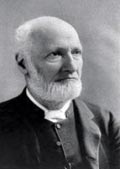the Fifth Week after Epiphany
Click here to join the effort!
Bible Commentaries
Schaff's Popular Commentary on the New Testament Schaff's NT Commentary
Old Testament
Jesus' life, teachings, and fulfillment of Old Testament prophecies as the Messiah. Mark
A fast-paced account of Jesus' ministry, focusing on his actions and sacrificial death. Luke
Jesus' life, emphasizing compassion for the marginalized and the universal scope of salvation. John
Theological reflections on Jesus as the Word of God, focusing on his divine nature and mission. Acts
The early church's growth, the apostles' ministry, and the spread of the Gospel. Romans
A theological treatise on salvation, grace, faith, and righteousness through Jesus Christ for all. 1 Corinthians
Paul addresses divisions, immorality, and spiritual gifts in the Corinthian church. 2 Corinthians
Paul's defense of his apostleship, his sufferings, and the power of God's grace. Galatians
Paul's defense of the Gospel of grace against legalism, emphasizing faith in Christ alone. Ephesians
Paul's teachings on the church's unity, spiritual blessings in Christ, and Christian conduct. Philippians
A letter of joy and encouragement, urging humility and faithfulness amid persecution. Colossians
Paul's emphasis on Christ's supremacy and warnings against false teachings. 1 Thessalonians
Encouragement to a young church, with teachings on holiness and Christ's return. 2 Thessalonians
Clarifications about Christ's return and exhortations to stand firm in faith. 1 Timothy
Guidance for church leadership, sound teaching, moral conduct, and defending the truth of the gospel. 2 Timothy
Paul's final exhortations to Timothy, emphasizing perseverance and faithfulness. Titus
Instructions for establishing order in the church, promoting sound doctrine, and living with integrity. Philemon
A personal appeal for the forgiveness and restoration of a runaway slave, Onesimus. Hebrews
An insightful look at Christ's supremacy, priesthood, and the fulfillment of prophecies. James
Practical wisdom on living out one's faith through good works and righteous behavior. 1 Peter
Encouragement for suffering Christians to remain faithful and hopeful in their trials. 2 Peter
A reminder to grow in faith, resist false teachings, and remain steadfast awaiting His return. 1 John
Teachings on love, obedience, and assurance of salvation through fellowship with God. 2 John
A letter encouraging love, obedience to God's commands, caution against teachings that deny Christ's truth. 3 John
A personal letter commending hospitality and warning against arrogance in church leadership. Jude
A strong warning against false teachers and a passionate call to defend the faith and uphold the truth. Revelation
Apocalyptic visions of God's ultimate victory, Christ's return, and the new heaven and earth.
Author's Biography
Philip Schaff (1819-1893) was a Swiss-born, German-educated theologian and ecclesiastical historian whose work and influence crossed oceans and denominations. Emigrating to the United States in 1844, Schaff made profound contributions to American religious life, significantly impacting theological education, ecumenism, and church history studies. His scholarly journey began with his education at the University of Berlin, where he was influenced by figures like August Neander and Friedrich Schleiermacher, leading lights of the 19th-century German theological scene.
Schaff's career in the United States was marked by an enduring commitment to the unity of Christian denominations. He advocated for a "catholic" (universal) Christianity that transcended denominational lines, a vision that was both ahead of its time and deeply rooted in the early Christian tradition. This ecumenical spirit informed much of his work, including his role in the American Bible Revision Committee, which produced the American Standard Version of the Bible.
Perhaps Schaff's most enduring legacy is his editorial work on the "Schaff-Herzog Encyclopedia of Religious Knowledge," an exhaustive reference work that remains a valuable resource for theologians and historians. However, his magnum opus is the multi-volume "History of the Christian Church," a comprehensive work that chronicles the development of Christianity from the apostolic age to the Reformation. This monumental work showcases Schaff's meticulous scholarship, his passion for the unity of the church, and his profound respect for Christian history and doctrine.
Philip Schaff's contributions to theology and church history reflect his deep faith, intellectual rigor, and a visionary belief in the unity of God's people. His works continue to inspire and inform scholars, pastors, and laypeople, serving as a bridge between different Christian traditions and historical epochs. Schaff's life and work embody a remarkable blend of academic excellence and ecumenical commitment, marking him as one of the most influential figures in 19th-century American Christianity.
